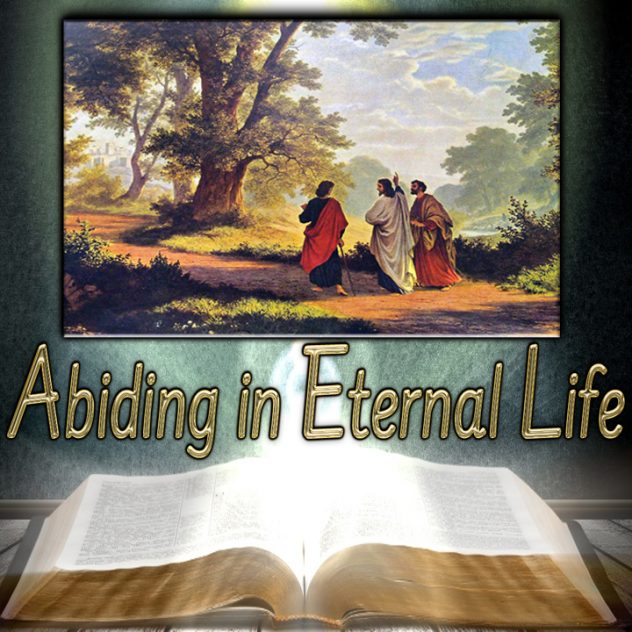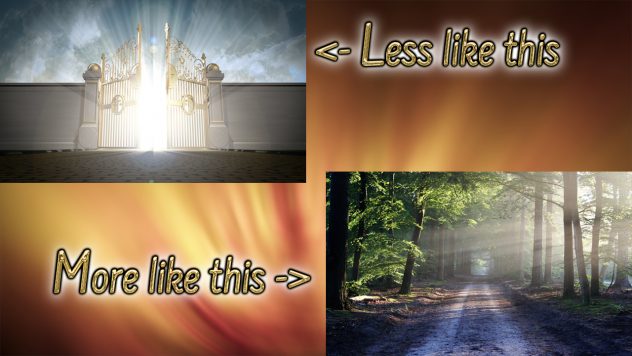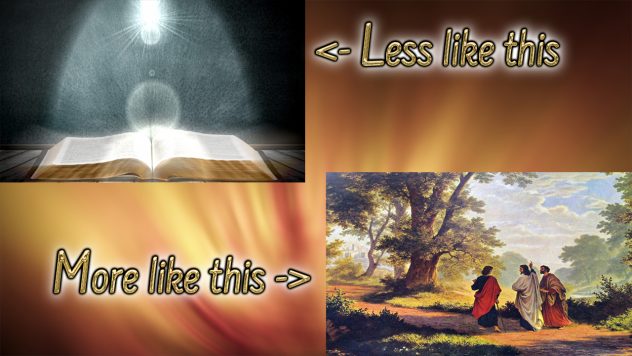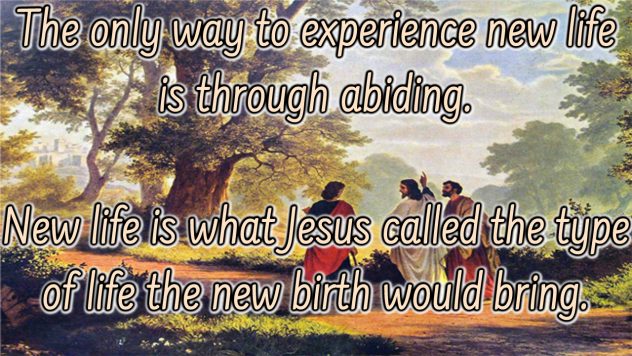Sunday 11/18/18
Series: For Edification
Message – Abiding in Eternal Life
Podcast: Download (179.0MB)
Abiding in Eternal Life
We ended last week with 1 Jn. 2:26-27…let’s turn there now and read verses 20-27.
“(20) But you have an anointing from the Holy One, and you all have knowledge. (21) I have not written to you because you don’t know the truth, but because you do know it, and because no lie comes from the truth. (22) Who is the liar, if not the one who denies that Jesus is the Messiah? He is the antichrist, the one who denies the Father and the Son. (23) No one who denies the Son can have the Father; he who confesses the Son has the Father as well. (24) What you have heard from the beginning must remain in you. If what you have heard from the beginning remains in you, then you will remain in the Son and in the Father. (25) And this is the promise that He Himself made to us: eternal life. (26) I have written these things to you about those who are trying to deceive you. (27) The anointing you received from Him remains in you, and you don’t need anyone to teach you. Instead, His anointing teaches you about all things, and is true and is not a lie; just as it has taught you, remain in Him.”
The last few weeks we’ve been looking at bear fruit through our union with Jesus our Vine. As we’ve looked at John 15 where Jesus declared that He was now the TRUE Vine and that those who were united with Him through belief and obedience were the branches…I told you that this chapter teaches us 4 things:
- Our union with Him
- The necessity of bearing fruit
- The means of bearing fruit
- The results of bearing fruit
We’ve covered our union with Him for the first few weeks and last week we stressed the necessity of bearing fruit in our examination of Verse 6
“If anyone does not remain in Me he is cast off as a branch and they gather them and through them into the fire and they are burned.”
This week we are going to look at the MEANS of bearing fruit.
As we do so we will, of necessity, encounter the word “LIFE” quite a bit and we know how Jesus defined life, but I think it is necessary to explore what His Jewish followers “heard” by the words eternal Life.
While it is true that the Jewish people at large had a belief in life after physical death and it shows up a few times in the Old Testament. Not surprisingly one of the clearest shows up in Daniel…
Dan. 12:1-3, HCSB “(1) At that time Michael the great prince who stands watch over your people will rise up. There will be a time of distress such as never has occurred since nations came into being until that time. But at that time all your people who are found written in the book will escape. (2) Many of those who sleep in the dust of the earth will awake, some to eternal life, and some to shame and eternal contempt. (3) Those who are wise will shine like the bright expanse of the heavens, and those who lead many to righteousness, like the stars forever and ever.”
But in the end, the meaning of eternal life was much broader both for the Jew and the early Christians than it is often understood today.
The words – “eternal life” if taken alone might have conjured the same basic notions to a Jewish audience in Jesus’ day as it does to us today, but often it did not appear “alone” but in a context where the meaning was obviously broader than simply going to heaven when you die.
What it typically meant was a life focused on matters of eternal importance – which is likely why the Jews thought that eternal life or a life focused upon eternal matters was achieved by searching the scriptures….
John 5:39-40, HCSB “(39) You pore over the Scriptures because you think you have eternal life in them, yet they testify about Me. (40) And you are not willing to come to Me that you may have life.”
Thus making eternal life look –
This is easily seen in a statement Jesus made which does not use the words “eternal life” specifically but the concept is clearly represented and it shows up particularly well in the Amplified version…It is found in Mark 8:35 and reads like this,
“(35) For whoever wants to save his [higher, spiritual, eternal] life, will lose it [the lower, natural, temporal life which is lived only on earth]; and whoever gives up his life [which is lived only on earth] for My sake and the Gospel’s will save it [his higher, spiritual life in the eternal kingdom of God].”
Now the reason I’m going into this is because I can never preach just one message – everything is WAY to inter-connected in my mind for that. But rightfully so, because you can see, (or at least you will see) that bearing fruit out of our union with Christ IS the high life this verse is mentioning. It IS the eternal Life I am going on a bit of a rant about right now…it is all the same thing and I stand to learn MUCH about the singular focus of the New Testament when we realize that it is often saying the same thing over and over – only using different words, illustrations and metaphors. Also, it reveals a gospel which stands in stark contrast to the “typical” Christian life which is little better than the lives lived by the world. A life focused largely on the affairs of THIS earthly journey rather than on God’s eternal Kingdom.
Paul warns Timothy about this by telling him that,
Interestingly – this IS all connected. A life that is largely lived for this world will be lacking in fruit and stands in FAR greater danger of losing focus of eternal things entirely in preference to this life. Paul ran into this in his ministry… 2Tim. 4:10, HCSB “(10) for Demas has deserted me, because he loved this present world, and has gone to Thessalonica…”
Peter also addressed this draw of the world as pulling oine away from their steadfastness in Christ – back into the world.
In 2Peter 2:17-22, “(17) These people are springs without water, mists driven by a whirlwind. The gloom of darkness has been reserved for them. (18) For uttering bombastic, empty words, they seduce, by fleshly desires and debauchery, people who have barely escaped from those who live in error. (19) They promise them freedom, but they themselves are slaves of corruption, since people are enslaved to whatever defeats them. (20) For if, having escaped the world’s impurity through the knowledge of our Lord and Savior Jesus Christ, they are again entangled in these things and defeated, the last state is worse for them than the first. (21) For it would have been better for them not to have known the way of righteousness than, after knowing it, to turn back from the holy commandment delivered to them. (22) It has happened to them according to the true proverb: A dog returns to its own vomit, and, “a sow, after washing itself, wallows in the mud.”
In fact, to make this entire circle complete let’s go back to the verse we just left in Mark 8:35 and read on to the end – we will see it says the same thing!
“(36) For what does it profit a man to gain the whole world, and forfeit his life [in the eternal kingdom of God]? (37) For what can a man give as an exchange (a compensation, a ransom, in return) for his [blessed] life [in the eternal kingdom of God]? (38) For whoever is ashamed [here and now] of Me and My words in this adulterous (unfaithful) and [preeminently] sinful generation, of him will the Son of Man also be ashamed when He comes in the glory (splendor and majesty) of His Father with the holy angels.”
So, back to this issue and definition of Eternal Life.
Upon searching the Internet for some information about how Jews in the 1st century might have understood this concept of “eternal life” I ran into an interesting article which I thought I would share with you since it so clearly connects where we have been with where we are going in our teachings on the “means of bearing fruit”.
The article is lifted from the En Gedi Resource Center’s website and is written by (Low-is Ta-ver-burg) Lois Tverberg who has a website as well at “ourrabbiJesus.com”.
Eternal Life, Here and Now
“…Pursue righteousness, godliness, faith, love, perseverance and gentleness. Fight the good fight of faith; take hold of the eternal life to which you were called.” 1Tim. 6:11-12
When we think of eternal life, we usually think of life after death in heaven. While that is a true definition, we often forget another aspect of eternal life – that eternal life starts now in the present, not just after we die. Interestingly, in the Jewish culture of around Jesus’ time, they discussed what it meant to live in eternity while here in this world. Often when Jesus uses the term “eternal life“, he also seems to be referring to the present world, and if we read his words thinking about only heaven, we may miss His point. Not only does looking at this Jewish idea clarify our reading, but it will give us wisdom about how to live in the world today.
In the Talmud, from the first few hundred years after Christ, there are several references to the rabbinic concept of eternal life. Often it was contrasted with fleeting life, or earthly life. Usually they didn’t speak of one as before death and the other after death. Rather, the first one “eternal life” or “lasting life”, referred to living a life focused on matters of eternal importance – living now as if you were living for eternity. In contrast to this was fleeting life which was referring to living a life that is only concerned about the short term material needs of today – working, making money, eating, etc.
The rabbis considered the study of Scripture one of the most important ways you could partake in eternity while on earth. A story is told about a rabbi who spent years in study of the Scriptures, and then walked past farmers tilling their land. He remarked, “they have abandoned lasting life (hayei olam) and involve themselves instead with fleeting life (hayei sha’ah).”
The rabbis had a humorous way of describing a person who only lives for today – they said that they had “the soul of a cow”, meaning that just as a cow stands all day long slowly munching grass, only thinking about where the next mouthful will come from, when people only focus on daily cares and material things, they live life no more towards eternity than an animal does.
Jesus’ Words About Hayei Olam
Jesus often mentions “eternal life” in the gospel of John, and often He seems to be referring to hayei olam – having a life in eternity here and now.
For instance:
“This is eternal life, that they may know You, the only true God, and Jesus Christ whom You have sent.” John 17:2
Using our more typical definition of life after death, this line doesn’t quite make sense. We may try to read it as, “We will have eternal life after we die if we know God and Jesus Christ.” But if we hear its intent to focus on the present life, we understand that Jesus is saying that knowing God intimately and living with Jesus Christ as Lord, here and now, is living as if you were already in eternity. This makes a lot of sense – what thing in our lives has more eternal significance than that?
Jesus makes one comment about eternal life that makes little sense without a knowledge of His Jewish context. As mentioned above, the rabbis considered the study of the Scriptures truly living out one’s “eternal life” – rising to a higher reality beyond everyday life by contemplating God’s eternal truths.
Jesus makes a comment that seems to critique that idea:
“You diligently study the Scriptures because you think that by them you possess eternal life. These are the Scriptures that testify about me, yet you refuse to come to me to have life.” John 5:39-40
Jesus is speaking to some of his fellow Jews who did not see that the Scriptures ultimately pointed toward him. Eternal life is not had even in studying the Scriptures, but in finding in them that Jesus is our Lord, and we can know and serve him.
Paul’s Words About Life
It appears that Paul also spoke about hayei olam. He points out that just as Christ died and rose again into eternal life, if we partake in Christ’s death through baptism, we now have this eternal life as well. We have been brought from death into life, and this eternal life is very much in the present world:
“We were therefore buried with him through baptism into death in order that, just as Christ was raised from the dead through the glory of the Father, we too may live a new life… For we know that since Christ was raised from the dead, he cannot die again; death no longer has mastery over him. The death he died, he died to sin once for all; but the life he lives, he lives to God. In the same way, count yourselves dead to sin but alive to God in Christ Jesus. Therefore do not let sin reign in your mortal body so that you obey its evil desires. Do not offer the parts of your body to sin, as instruments of wickedness, but rather offer yourselves to God, as those who have been brought from death to life; and offer the parts of your body to him as instruments of righteousness.” Romans 6:4, 6-13
To Paul, if we now are living in our “eternal life” we should not let sin reign over us, but live the way God designed us to live. Just as Jesus now has eternal life, we have it too, here and now, and extending after we die. Paul exhorts us to “pursue righteousness, godliness, faith, love, perseverance and gentleness. Fight the good fight of faith; take hold of the eternal life to which you were called.” 1 Tim 6:11-12. We need to take hold of our eternal lives and live them well now, not just wait for them in the future.
How Do We Live Eternal Life Now?
This question was essentially what the rich young ruler said to Jesus – how can I acquire eternal life? (Luke 18:18-22)
Our traditional reading assumes he is asking about eternal life after he dies. While we can’t be sure, it is interesting to read that story with the idea of living a life focused on matters of eternal importance in mind. The man has read and obeyed the Scriptures, but Jesus sees that his wealth is what keeps him bound to hayei sha’ah – “a fleeting life” – an empty life focused only on material gain. Jesus says that if he wants true life, he should give away the wealth that binds him, and follow after Him as one of His disciples. Then he would have hayei olam eternal life or a life focused on matters of eternal importance – as in John 17:3 – knowing Christ and the Father intimately, in this life and for eternity.
The ruler declines the offer, to Jesus’ sorrow.
We should look at ourselves in the rich man too – are we so distracted by our material wealth that it keeps us living for what will not matter in eternity?
We are not obligated to give all our money away, but our focus should be to use it to invest in eternal things – sharing the gospel, deepening our relationships, and helping others in need. We have Jesus’ blessing to spend our money extravagantly on things that will show God’s love. We should also look at how we spend our time – on ourselves; or else on God and others. Do we fill our extra time with mindless entertainment, empty TV shows or godless living? Or do the things we do invest in people who will live forever, like nurturing friendships, showing hospitality, raising children, and loving others?
As Paul says,
“For the one who sows to his own flesh will from the flesh reap corruption, but the one who sows to the Spirit will from the Spirit reap eternal life. Let us not lose heart in doing good, for in due time we will reap if we do not grow weary. So then, while we have opportunity, let us do good to all people, and especially to those who are of the household of the faith.” Galatians 6:8-10
The Challenge of “Here and Now” Eternal Life
When we only think of eternal life as “going to heaven when you die”, and not a new life in this world, we actually can distort the gospel’s message. Sometimes the gospel is presented starting with the question, “Do you know what would happen if you died tonight?” And then the next statement is, “If you receive Christ, you can know where your eternity will be spent.” If nothing else is added to this, the gospel becomes a hollow kind of “fire insurance” that has nothing to do with our lives, but is just concerned with what will happen after we die. It’s an easy thing to offer people, because their lives don’t need to change, and it is easier on us too because we can go on as shallow people of hayei sha’ah – living only for today.
In contrast, Jesus said, “I have come that they may have life, and have it to the full.” (John 10:10) Following Christ is what gives our lives here eternal meaning and purpose. How can we forget to share that with people? The world is full of people who see no meaning in life here on earth – perhaps we would have a stronger witness if we had obviously different lives, and we invited others to join us in investing our lives in eternity with Christ.
Now, with this expanded and more clear definition of eternal life in our minds let’s consider what Christ was saying in John 15. The only way to live a life of fruitfulness – that is a life focused on furthering His eternal kingdom both within your own heart and in those around you – is though abiding in Him.
A short way to say this is – The only way to experience new life is through abiding.
New life is what Jesus called the type of life the new birth would bring.
So the question we are answering today is…
How do we bear fruit or How do we Abide?
Well let’s read the next few verses in John 15.
“(7) If you remain in Me and My words remain in you, ask whatever you want and it will be done for you. (8) My Father is glorified by this: that you produce much fruit and prove to be My disciples. (9) “As the Father has loved me, I have also loved you. Remain in My love. (10) If you keep My commands you will remain in My love, just as I have kept My Father’s commands and remain in His love. (11) “I have spoken these things to you so that My joy may be in you and your joy may be complete. (12) This is My command: love one another as I have loved you. (13) No one has greater love than this, that someone would lay down his life for his friends. (14) You are My friends if you do what I command you.”
Jeremiah 31:31-34,
HCSB
“(31) “Look, the days are coming”–this is the LORD’s declaration–“when I will make a new covenant with the house of Israel and with the house of Judah. (32) This one will not be like the covenant I made with their ancestors when I took them by the hand to bring them out of the land of Egypt–a covenant they broke even though I had married them”–the LORD’s declaration. (33) “Instead, this is the covenant I will make with the house of Israel after those days”–the LORD’s declaration. “I will place My law within them and write it on their hearts.
The New Covenant writes His words upon our hearts!
I will be their God, and they will be My people. (34) No longer will one teach his neighbor or his brother, saying: Know the LORD, for they will all know Me, from the least to the greatest of them”–the LORD’s declaration. “For I will forgive their wrongdoing and never again remember their sin.”
This service had content that is NOT written out here, so I would encourage you to listen to it WHILE you read…Blessings!
I hope this teaching will challenge you and encourage you to place your trust in the Lord Jesus Christ as Savior and Lord.
You have a special place in God’s family & kingdom. If you do not know Him, please use our ‘Contact Us‘ page and reach out so we may have the privilege of introducing you to the Lord. Neither money nor attendance at our church will be mentioned.
If you have been spiritually fed by this ministry and wish to give, we truly appreciate that and you may do so here, but all outreaches of this ministry are FREE for you and anyone to enjoy at no cost.
Blessings!




